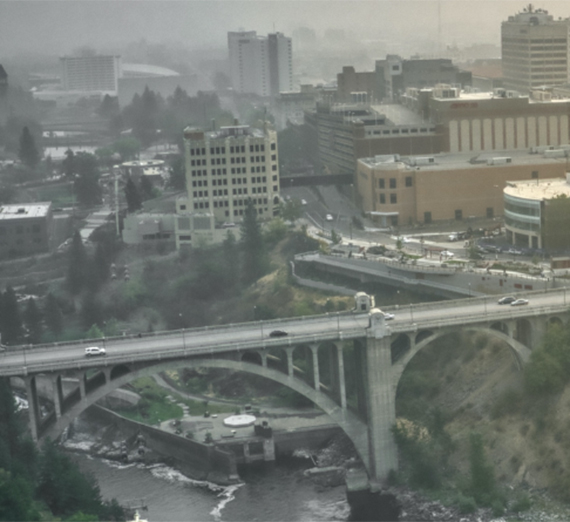Climate Institute Announces Community Resilience Plans to Prevent Climate-related Illness and Death

The heat dome that descended on Spokane and the greater Pacific Northwest in the summer of 2021was the sort of catastrophic weather event that will be remembered for generations.
Record-setting temperatures by day — reaching 109 degrees Fahrenheit — and little relief at night combined to cause at least 19 deaths in Spokane County and 157 across the state of Washington, making it the deadliest weather-related incident in state history. Add in Oregon and the number of heat dome-related deaths climbs toward 600 according to a New York Times analysis.
The extreme nature of the heat dome illustrated just how insufficiently prepared many communities are to support their most vulnerable citizens in a crisis, whether it be extreme temperatures or plummeting air quality caused by area wildfires.
Gonzaga’s Institute for Climate, Water, and the Environment, established the same year as the heat dome, has put mitigating the risks of extreme weather at the center of its work since its formation. In addition to collecting data and doing research and promoting climate-related conversation and scholarship, the Climate Institute recognized the need for greater coordination in addressing climate-related hazards and two years ago helped form the Spokane Community Resilience Collaborative.
That collaborative, which also includes entities such as the City of Spokane, Avista Utilities and the Spokane Regional Health District, now has released the first drafts of two community resilience plans for public review—one focused on extreme heat, and one on wildfire smoke. Both plans are available to read here.
These plans are the guiding frameworks for Spokane to effectively prepare for, respond to, and recover from extreme heat and wildfire smoke. They aim to proactively enhance the community’s capacity to protect public health and safety, minimize the impact of heat-related emergencies, and foster overall community resilience. And they are a natural outgrowth of the goals the Spokane Community Resilience Collaborative established upon its formation in 2023.
The group, facilitated by the Gonzaga Climate Institute, is comprised of representatives of organizations in diverse fields such as healthcare, education, government, and nonprofits who use their shared knowledge and expertise to support each other's work and jointly pursue new work to support a Spokane regional community that is prepared for and adaptable to change. The SCRC primarily focuses on resilience to extreme heat and wildfire events and all their interconnected challenges.
Since the collaborative’s formation, it’s established three primary goals:
1. Develop city-wide extreme heat and wildfire smoke action plans for Spokane.
2. Develop a network of climate resilient community buildings with supportive programming and infrastructure throughout Spokane.
3. Create and maintain digital tools that provide educational resources to build household-level resilience to extreme heat and wildfire smoke.
The two new resilience plans mark significant progress for the collaborative.
That action is needed now, perhaps more than ever. Four years after the heat dome, the Spokane area continues to set record high temperatures during the summers, including just last week. And In addition to extreme heat, wildfires are becoming more frequent and severe across the western United States and Canada, leading to worsening air quality even for those far from the actual fires. In Washington state, wildfire smoke has become the largest source of particulate pollution, contributing significantly to deteriorating air quality. Since 2015, the Spokane region has experienced a 353% increase in poor air quality days.
Climate change is expected to further intensify wildfire conditions by driving hotter, drier summers and extending fire seasons, increasing Spokane’s vulnerability to smoke-related health risks. Fine particulate matter from wildfire smoke is especially harmful, as it can penetrate deep into the lungs and exacerbate respiratory and cardiovascular conditions. Populations most at risk include children, older adults, pregnant individuals, and those with preexisting health conditions, along with outdoor workers and economically disadvantaged groups who may have fewer resources to protect themselves from exposure.
“These resilience plans have been created by the Spokane community, for the community, with the belief that different organizations have different abilities, different solutions to contribute, and different levels of responsibility,” says Professor Brian G. Henning, director of the Gonzaga Climate Institute. “To successfully protect our community from future climate-induced events, everyone has an important role to play. In working together and collaborating with partners throughout the region, our community will increasingly be more resilient to our rapidly and dangerously changing climate.”
Read drafts of the Resilience Plans here.
Learn more about the Spokane Community Resilience Collaborative here.
Help the Institute’s Climate Resilience Project do more with a capacity-expanding gift.
